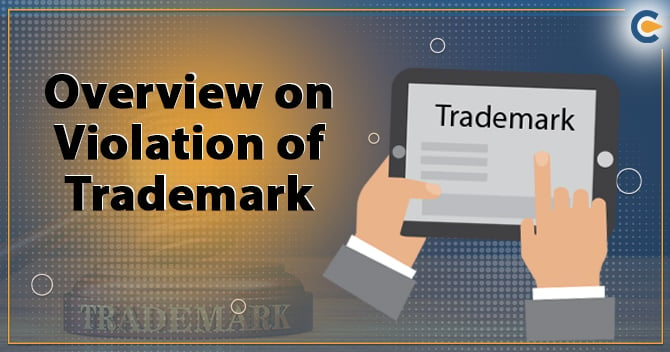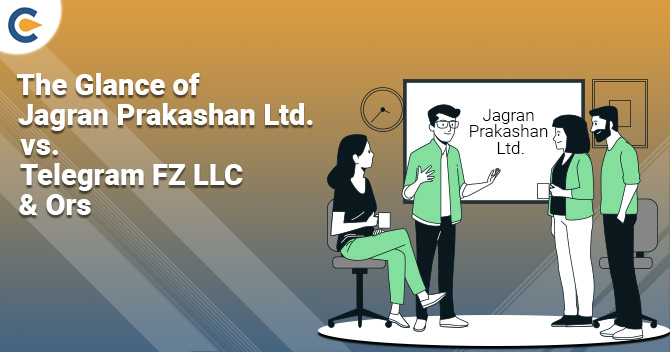When a person has worked hard and established a logo and design for your brand, how can they prevent other companies from using it? Trademark is all around us. When you design a logo for your brand, there might be a chance that it can resemble with other company’s trademark. In such a situation, violation of trademark arises.
Scenario when Violation of Trademark arises
There are several possible cases when a violation of trademark occurs-


Similar to a registered trademark
Any mark that is similar to the registered trademark, and there is a similarity in the business too.
Identity with Registered Trademark and Goods and Services
It is a mark that is similar to the one which already exists, and the goods and services delivered are identical. In such cases, the courts will decide if the user will be a cause of uncertainty for the general public.
Similarity with a well-known trademark
Trademark is identical to a well-known trademark in India.
Similarity of a Trading Name with registered trademark
The name of trade is similar to goods and services that run under the originally registered trademark.
Application for a registered trademark on labeling or packaging
A person who has no claim used the already registered trademark without any consent from the owner of the trademark.
Use of registered marks in Advertisements
There is an unfair advantage and works in conflicting, straightforward commercial and industrial practices.
Read our article:Process of Trademark Registration: Step by Step Guide
Protection against Violation of Trademark under Trademark Act, 1999
The provisions of the trademark act protect the violation of trademark in some instances. They are as follows-
False Application of Trademark
Section 103 and Section 104 grants for imprisonment for a term not less than six months which further can extend up to 3 years and fine imposed not less than INR 50,000 that can be extended up to INR 2 Lakhs. The penalty, as mentioned earlier, is charged in case of the false application of trademark.
Powers of Police
Under Section 115 (4) of the Act confers the powers of police for a method of search and seizure of any products which summons for action against infringement of the trademark.
Certificate of Opinion
The catch in this section is that police officer, before doing any raids and takeover, has to take a certificate of opinion from the Registrar on facts of the case and shall abide by the same. The Registrar is not compelled to provide any such idea and the database available to the Trademark registrar. If the certificate of opinion is not satisfactory then it restrains the Registrar from giving a full proof opinion to the non-availability of the database containing word marks as well as device marks or symbols or labels.
Injunction
To stop the manufacturer from the counterfeit product for sale, a civil remedy can be acquired by the proprietor where a court can issue Order of Injunction in which an individual is obliged to perform or restrained from performing, particular Act. The general rules for governing the grant of an injunction are contained in Sec-36 to 42 of the Indian Specific Relief Act, 1963 and Order XXXIX Rules 1 & 2 and Sec 151 of the Code of Civil Procedure, 1908.
Damage Cost
Any proprietor whose trademark has been violated by the sale of Counterfeit products, the said person can demand compensation from the opposition against the profit made out from the sale of the counterfeit product through unauthorised use of trademark pertaining to the proprietor.
Protection against IPR infringement under Customs Act, 1962
The proviso of the said Act talks about the refusal of Import and Export of such kind of goods which are in the context of infringement of patents, trademarks, copyrights, designs, and geographical indications by Section 11. Section 113 gives power to the competent officer for the confiscation of infringing goods to be utilised for export and also following Section 112/114, and penal action can be exercised against any such importer or exporter of infringed goods.
Preservation of Brand from Counterfeit
Most of the people are associated with making and selling counterfeit products in India but not aware of the fact that this activity constitutes a liability for criminal and civil action. The general perception amongst such traders is that it is a mere art form of advertising and selling goods.
Legal Proceedings for Counterfeit Products
The legal process relating to counterfeit products that contain few deficiencies which have been mentioned below:-
Abuse of legal proceedings
Lawyers of the defence side try to delay the proceedings by questioning the FIR filled and the raid conducted by the investigating officer. They claim remedy available under Section 482 of Code of Criminal Procedure, affirming that the FIR[1] was fake and no police took any action/seizure or by invoking that the proceeding is illegal and deceitful against the principles of natural justice or by challenging the jurisdiction of the Court.
The Investigation by the Police
Police officer under competent authority must conduct raids at the place where the sale of counterfeit products is taking place. The name of witnesses stated in the charge sheet filed either that goes missing or turn hostile due to a prolonged period of stretch in criminal cases. The investigating officer lacks adequate knowledge regarding the components of IPR infringements and proceedings to be followed for quick action.
Obstacles occurred by Manufacturers and Police
The people that are involved in the manufacturing process and sale of counterfeit products have powerful political influence as they are part of large domestic markets of the society.
The police officer can also make certain excuses, these excuses are mentioned below-
- The offence of the infringement is not cognizable;
- There is no such cause of action;
- The premises of the offender’s are beyond the jurisdiction of the police officer;
- No action can be exercised as the trademark is unregistered.
Failure of Police in Recognizing Dissimilarities
The raid to be conducted is sometimes denied because police officer fails to recognize the negligible variations in case of a matter of trademark infringement.
Conclusion
In India, there is a sudden increase of the demand for registration of trademarks day by day, clearly indicating the awareness developing among people to safeguard their products. Violation of trademark is a common sight nowadays. Although there exist several remedies to cope up with the same, not many are implemented the way they should be.
There are loopholes in every procedure that are carried out to eliminate infringement, ultimately hinder the law in hand. Violation of any such kind of trademark may lead to a negative impact on the individual or the entity, thereby reducing the brand value. If you want to know more about Trademark infringement or Trademark registration, contact our experts at Corpbiz.
Read our article:Unconventional Marks in India- Not an Ordinary Trademark











